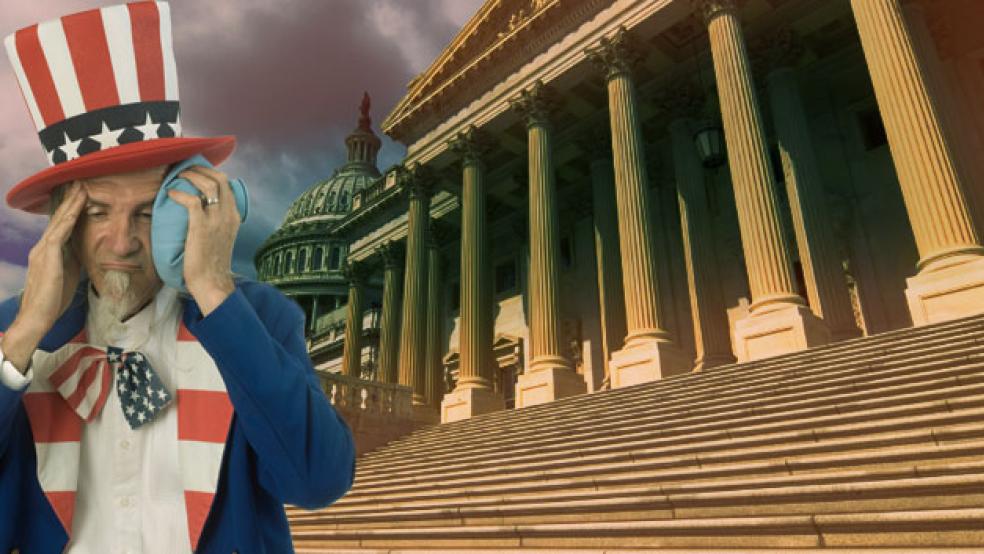This government shutdown has been brewing for three years – and now it’s happening.
The 2010 election set the wheels in motion when Republicans gained control of the House, while President Obama and Democrats held a firm grasp on the White House and Senate. Each ensuing fiscal battle that followed made a shutdown inevitable.
At the stroke of midnight on Monday, the breakdown finally occurred and large swaths of the federal government will begin the process of closing today.
RELATED: FISCAL FIASCO—WILL A SHUTDOWN CAUSE A MARKET MELTDOWN?
In a single day, the Democratic controlled Senate twice rejected different House-passed measures that would keep the government open through Dec. 15, provided that the Affordable Care Act was postponed for a year and other changes were made to the 2010 health care law. These conditions are unacceptable to President Obama and Senate Majority Leader Harry Reid (D-NV).
Within an hour of the House passing on Monday its third attempt to stop Obamacare in order to temporarily fund the government, the Senate rejected this measure along party lines. The Senate did reportedly float one last proposal: a six-week extension of spending to give the two sides time to work out their many differences. But that alternative went nowhere in the House.
House Republicans countered with a motion to request a conference committee with the Senate to hash out a continuing resolution, putting the vote before the House Rules Committee after 11:00 pm. That particular motion was designed—in defiance of the standard rules—to prevent House Democrats from putting the Senate measure passed last week that preserves Obamacare up for a vote on the House floor.
Reid promptly rejected the approval of going to conference—a procedure that can take days—in the midst of a shutdown. “We will not go to conference with a gun to our head,” Reid said. The first thing the House has to do is pass a clean six week CR and they can do that right now. If they do that, then we’ll agree to work with Republicans on funding for the government for the remainder of the fiscal year.”
House Republicans were still pressing for some kind of reconciliation on their terms as midnight approached, officially signifying the first shutdown since 1996. The halting of government operations could be resolved within hours, but shortly before midnight the White House Office of Management and Budget issued a memo instructing agencies to “now execute plans for an orderly shutdown due to the absence of appropriations."
RELATED: THE SHOCKING COST TO TAXPAYERS OF A SHUTDOWN
The clock finally ran out on the two warring parties as a new fiscal year dawned without a single new spending bill approved – even after Obama made a last ditch effort with an evening phone call to House Speaker John Boehner (R-OH).
“I didn’t come here to shut down the government, I came here to fight for a smaller, less costly and more accountable government,” Boehner said on the House floor less than four hours before the shutdown took hold. “But here we find ourselves in this moment dealing with a [health care] law that’s causing unknown consequences and unknown damage to the American people and its economy.”
But a fiery House Minority Whip Steny Hoyer, a Maryland Democrat who represents many government workers, said the shutdown reflected Republicans’ “continuing destructive obsession” with Obama and his health insurance mandate.
Turning to Boehner, Hoyer said that Republicans “can get up here and say over and over and over and over again we don’t want to shut down the government, but their actions belie their words.”
The past three years of near crises almost perfectly foreshadowed this breakdown.
The U.S. government nearly defaulted in 2011 during the debt ceiling standoff in a major dispute over the deficit, entitlement and tax reform and the long term debt. An income tax hike almost kneecapped the economy last year, until Boehner and others broke with their party for a deal with the Senate and Obama that only raised tax rates for the wealthiest one percent.
This year began with the pressure for both chambers to approve a budget and then reconcile their differences. The Democratic Senate passed their budget, but House Republicans refused to iron out the differences with their own blueprint that balanced the budget by wiping out all Obamacare spending.
Flirt with disaster often enough and it will eventually happen. The Republican House approved three bills in recent weeks that temporarily fund the government but require the elimination or—in two instances—the delay of Obamacare.
On Monday afternoon, Obama insisted that he could only stop the dysfunction by refusing to yield. Otherwise, the same disastrous cycle will continue to repeat itself when another continuing resolution must be passed or when the debt ceiling must again be increased by Oct. 17 to prevent an unprecedented U.S. government default.
“Does anyone truly believe that we won’t have this fight again in a couple of more months?” the president said at the White House. “Even at Christmas?”
Obama then laid out in detail the consequences of a shutdown. NASA will “almost entirely” be closed. Tourists will be turned away at national parks and the Smithsonian museums. Federal paychecks will be delayed, while more than 800,000 government employees will be furloughed and lose pay. Services for seniors, children and veterans will be “hamstrung.” Small businesses will be unable to obtain loans.
The economic impact of all of this is unknown, as it depends on whether the shutdown quickly ends or drags on for weeks. Obama blamed the source of the gridlock on a few dozen GOP lawmakers aligned with Tea Party principles. Led by the likes of Sen. Ted Cruz (R-TX), Sen. Mike Lee (R-UT), Rep. Tom Graves (R-GA), and Rep. Jim Jordan (R-OH), this group claims they don’t wish to see a shutdown, yet they seem content enough to risk closing the government in order to slow—if not stop—the health insurance mandates in Obamacare.
The lone source of agreement was a measure—approved by the Senate and House—to guarantee that the military still gets paid during a shutdown. Obama must now sign that bill.
House Republicans have blasted the administration for not coming to the bargaining table to work out their differences. Boehner and Cruz have each noted that president would talk with Iran and Russia’s Vladimir Putin about chemical weapons in Syria but not his fellow Americans about the budget.
By Monday afternoon, Boehner announced that they would send to the Senate their third version of a temporary spending bill. Their first offering removed all financing for Obamacare. Their next bill would delay the program for a year and eliminate a tax on medical devices. This third proposal would again delay Obamacare but eliminate the exemption that congressmen have from the program.
“It’s pretty clear that what our members want is fairness for the American people,” Boehner said after meeting with his caucus. “The president provided a one year delay of the employer mandate. He’s provided exceptions for unions and others. There’s even exceptions for members of Congress. We believe that everyone should be treated fairly.”






